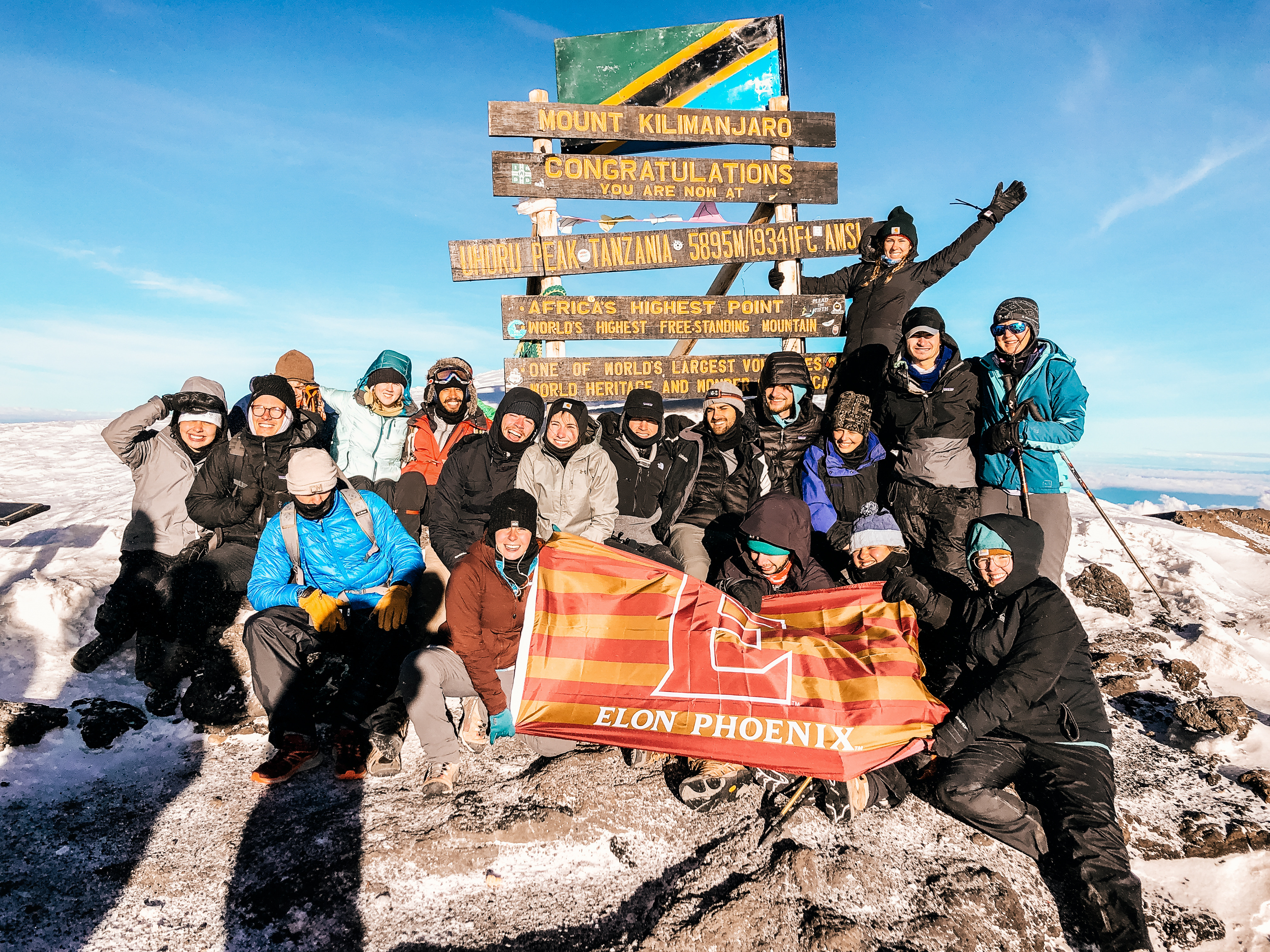"Kilimanjaro Millennial Style: The Mountain We Climbed" is the collective effort of 22 students and three Elon faculty and staff members covering their experience climbing Africa's tallest mountain.
Do shared hardships build deeper bonds?
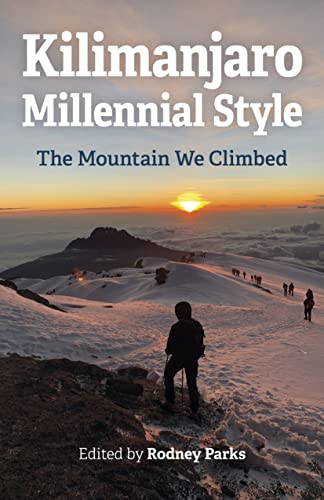
It’s a question Elon Registrar and Assistant Vice President Rodney Parks regularly asks students in his Wilderness and Adventure Therapy class days before they make a trek to Tanzania to climb the largest freestanding mountain in the world – Mount Kilimanjaro.
In a new book to be released this week, 22 Elon students and two Elon staff members who climbed Kilimanjaro during Winter Term 2020 offer their response to that important question.
Part travel guide and part oral history, “Kilimanjaro Millennial Style: The Mountain We Climbed” surrounds the notion of overcoming challenges, using the climbing of one of Earth’s seven summits as an analogy for the many hardships faced in everyday life.
Students in the inaugural Winter Term course converted their final reflection papers into a collection of essays for the book, with reflections from Elon staff members Kristen Aquilino and Kelly Reimer included as well. Edited by Parks, “Kilimanjaro Millennial Style” will be released Friday, Jan. 28, by Changemakers Books.
Creating the book
The idea for the book was born out of the idea that the students in 2020 should be more engaged in reflecting on their own “peak experience” at Mount Kilimanjaro than just recounting the course in a three-page, double-spaced paper. Parks assigned each student a topic involving the experience of climbing Kilimanjaro and their task was to write about that topic, thus creating a guide that could be passed down to the next class that would go on the trip.
Reading through the papers detailing how the course and experience with the mountain impacted them, Parks realized the lessons they wrote about could have an even broader audience.
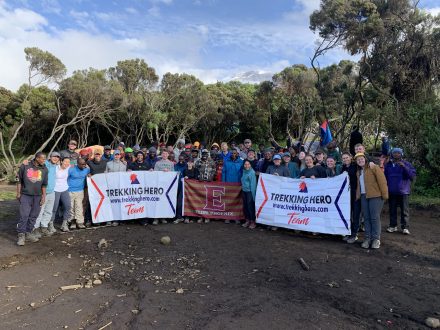 “I had read their papers and thought, ‘There’s a lot of value in this,’” Parks said. Initially, he was just going to compile something he could give back to the students but then wondered if someone would actually publish it.
“I had read their papers and thought, ‘There’s a lot of value in this,’” Parks said. Initially, he was just going to compile something he could give back to the students but then wondered if someone would actually publish it.
Parks reached out to Tim Ward, the publisher of Changemakers Books and author of “Zombies on Kilimanjaro,” to see if Changemakers would be interested in publishing it. According to Parks, Ward said that what he read from the Wilderness and Adventure class was unlike anything he’d come across before in literature on Kilimanjaro.
“The collective perspectives of these 22 young authors create a stunning kaleidoscope through which we experience the dazzling and sometimes harrowing trek to the top of Africa’s most iconic mountain,” Ward said in praise of the book.
Parks wanted to make sure that a wide scope of topics was included in the book. the student reflections cover each day of the trip, the porters and people of Kilimanjaro, accidents during the climb and the negative effects of ecotourism, among other topics.
“You could say the biggest adventure was writing this book,” Parks said. “The students are now published authors, and it was nice to have the support of other colleagues on campus.”
President Connie Ledoux Book and Professor of Education Carol Smith both contributed to the foreword for the book.
Nathan Jones ’20 was the teaching assistant for the inaugural class and helped write the chapter, “Summit Night.” Jones said that he was inspired by his experience of dealing with the pandemic while completing his degree at Elon and wanted to address how there’s always another hurdle to clear in life.
“Finding ways to balance and paint a holistic picture of what was going through my head, my body and my relationship with people was tricky,” Jones said. “I wanted to write about false summits because it was an experience that a lot of us had felt. A psychological experience of seeing what you think is the summit and getting there and realizing that there’s always another peak.”
Emma Renfro ’20 and Daniela Nasser ’20 co-authored the third chapter of the book, “The History, Climate and Ecosystems of Mt. Kilimanjaro.” In Swahili, Kilimanjaro loosely translates to “the white mountain” Renfro and Nasser wrote, as they highlighted the mountain’s growing popularity as a bucket list destination for globetrotters and its five different climates zones.
“We tried to take it all in for its originality and beauty, reminding ourselves of our purpose for climbing,” Renfro and Nasser wrote. “Now more than ever, we began to feel greater determination and more pride in every step we took.”
Bailey Honig ’20 broke his ankle on the way down after summiting and wrote about his experience in the chapter, “Accidents and Incidents.” Honig detailed the grueling journey to get to the top and the grueling journey to get back to the bottom.
“Mt. Kilimanjaro left me with a broken ankle, but also with one hell of a story,” Honig wrote.
Experiential education
In the first section of “Kilimanjaro Millennial Style,” Smith offers an overview of experiential education, noting that “experiential education provides a transformative pedagogy that enhances resiliency and adaptability.”
Experiential education is defined by the Association for Experiential Education as “a teaching philosophy that informs many methodologies in which educators purposefully engage with learners in direct experience and focused reflections to increase knowledge, develop skills, clarify values and develop people’s capacity to contribute to their communities,” according to the Association for Experiential Education.
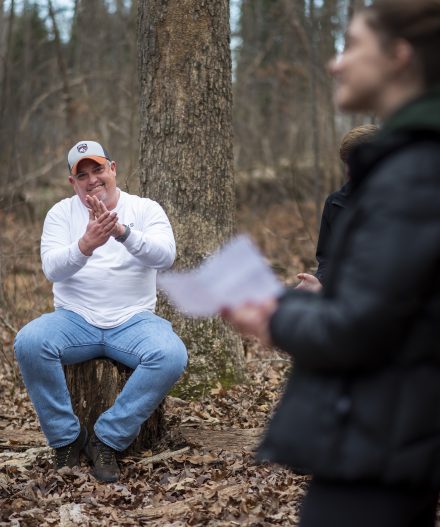
There’s a need for resilience and adaptability when hiking a 20,000-foot mountain, and in the weeks leading up to the trip before students step foot on the continent of Africa, these characteristics are on full display. Parks said the course has a “flipped classroom” model, with students completing readings and assignments at home while utilizing the in-person time for real-world problem-solving activities.
The class meets at the Elon Lodge west of campus for each period before leaving for Tanzania and after they return. During their time, they make use of the various obstacles at the site for team-building exercises that also see them build trust among each other.
The Wilderness & Adventure Therapy COR 3310 course aims to “introduce students to the skills needed to successfully facilitate therapeutic wilderness and adventure experiences by exploring the concepts and practices underpinning these approaches.”
“For three hours, we’re demonstrating the counseling and group therapy techniques, we’re doing some of the low ropes elements and at least one high ropes element. So, the students are getting lots of team-building type experiences,” Parks said.
Reflecting on their journey up the mountain and how it relates to the techniques covered during the traditional class sessions is a prime example of experiential education, that Elon is intentional about creating, said Kelly Reimer, senior director of Teaching and Learning Technologies. Additionally, writing what would become the chapters in the book offered the 2020 students a great opportunity to reflect on their experiences.
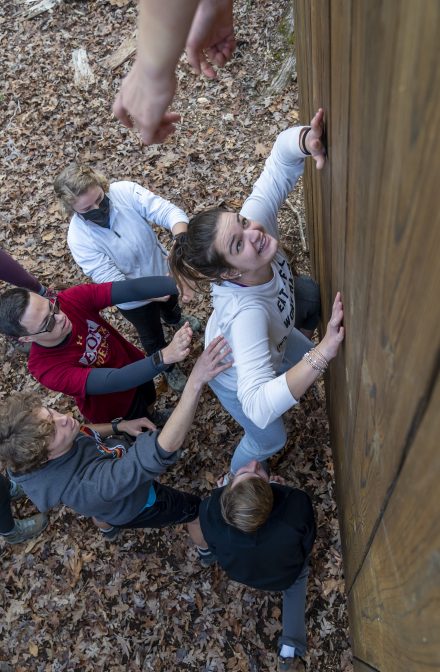
“It’d be really easy to go have an awesome study abroad experience and then jump right back into life at Elon,” said Reimer, who served as a co-instructor for the first trip to Kilimanjaro in 2020. “But this gave them a moment of pause to really think about and reflect what was that experience like.”
Parks earned his doctorate in counselor education, school counseling and guidance services and has considerable experience in the intricacies involved in counseling. Getting students involved in outdoor activities allows them to open up and better handle challenging situations, he said.
“It’s a counseling course, so we’re using a type of group therapy like we would do in a true adventure therapy program, and I teach it in a way that allows the students to experience what an adventure therapy program is like on the outside as a job,” Parks said. “Adventure and wilderness are areas that always have a lot of job openings and draw people that like that sense of being outdoors.
“They begin to understand that this can help not just me in a culture that is seeing higher amounts of depression and anxiety, but they begin to think about, ‘How can I use these skills for others around me?’” Parks added.
‘A military-style death march to the top’
Kilimanjaro is 19,341 feet high and the highest point on the continent of Africa. Every year, 50,000 tourists take on the mountain and since the first trip in January 2020, Rodney Parks has led approximately 60 students to Tanzania for the climb, with the latest group summitting the mountain just days before the release of “Kilimanjaro Millennial Style.”
The mountain is a dormant volcano with five different climate zones – cultivation, forest, heather-moorland, alpine and arctic. Compared to the likes of Everest, K2 or Denali, Kilimanjaro is not as challenging as those iconic peaks but that does not mean it should be taken lightly. Parks warns the students of altitude sickness, potential injury and the overall unpredictability that comes with the challenge of scaling a mountain.
“Climbing Kilimanjaro is as much mental as it is physical. You start to get in your head and wonder, ‘Can I really do this?’ But the support that each of the students has for one another, there’s a natural push to the top,” Parks said.
The shift in the mindset of the students is what Parks finds more rewarding in the trip.
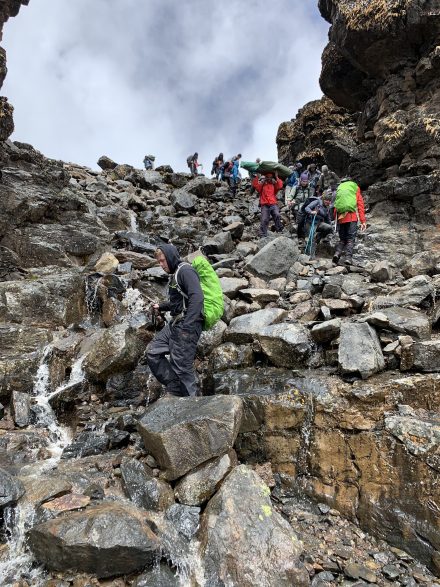
“The pleasure I get from it is to see the reaction of our students, because they will frequently say, ‘Gosh, if I could do this, I could do anything in life.’ It’s amazing to hear them say those things and to feel like they’ve made bonds that will transcend even Elon because of this shared experience,” Parks said.
Haydn Stucker ’23 is an engineering and computer science double major who is among the group of students participating in the course during the current Winter Term. On the first day of class, Stucker and all his classmates had the same goal — to make it to the summit. But after only a week in the Wilderness & Adventure course, the class has a more holistic view of what they hope to achieve.
“What has changed for me isn’t necessarily the goal, but it’s how I would deal with the failure if I would not be able to summit,” Stucker said. “How I’ve shaped that interpretation of failure now is an overall shift to a more positive approach of what I did experience and how I’m going to take that moving forward.
“Whether in the lessons learned from the failure or the other great experiences while also using that motivation, not even just the next time I’d be at Kilimanjaro but the next time I have a setback that’s significant to me in my life,” Stucker added.
The fastest summit of Kilimanjaro is six hours and 56 minutes by Swiss mountain guide Karl Egloff in 2014. It’ll take Parks, the students, three Elon staff members, eight guides and 67 porters seven days to get to the top.
On the last morning of the trip, the students will wake up at midnight and hike the final 4,000 feet. With temperatures reaching as low as 20 degrees below zero, oxygen running thin and the majority of it undertaken in complete darkness, it’s the most difficult part of the journey, Parks said.
“In the book, the climb referred to as a ‘military-style death march to the top,’” Parks said. “But we make it because we’re there together, we’re pushing each other and taking one step at a time. For the students to get to the top of that mountain at sunrise is an experience like no other. It’s life-changing.”
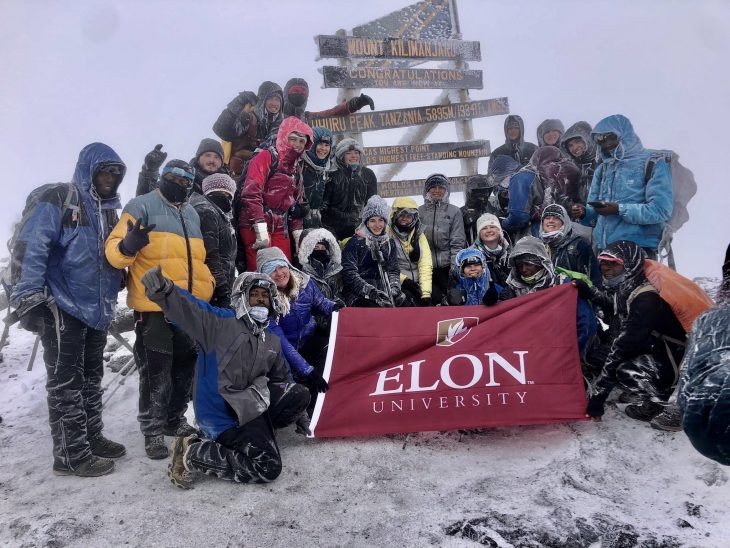
Shared experiences and bonds built
The course starts with the common goal of reaching the summit, and working toward that goal fosters new relationships and bonds.
One student wrote, “I would never want to go back and hike Kilimanjaro. I want to remember what it felt like at the top with the people I was with.”
“We have two-person tents on the trail, and it’s not uncommon for those to end up being three- or four-person tents because they’re so comfortable with each other,” Parks said when speaking about how close each class gets during the climb.
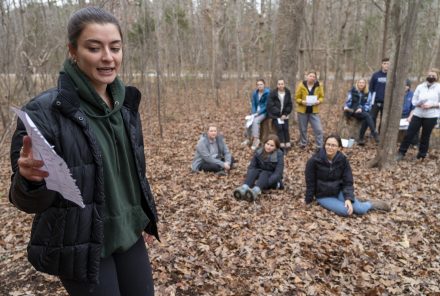
This bonding starts before the journey, due to the nature of the course, and the challenge of climbing Kilimanjaro only deepens those bonds.
“They begin to let their guard down and they begin to have this deep connection with you on the trail which then allows them to share more about who they are and their lives,” Parks said. “The same thing happens in the class itself here at Elon. They get more and more comfortable with each other … and then they start to share some of their own life experiences and what they find is a lot of students have had very similar experiences.”
Serving as co-leader with the COR 3310 class to Tanzania, Reimer said she found herself engaging with more students than she does in her role on campus at Elon, as well as supporting them and relying on them for help.
“I had some really deep conversations with students on that trail that I never would have had at my desk,” Reimer said. “Having those hardships together, I think, changed the trajectory of some of those students’ lives.”
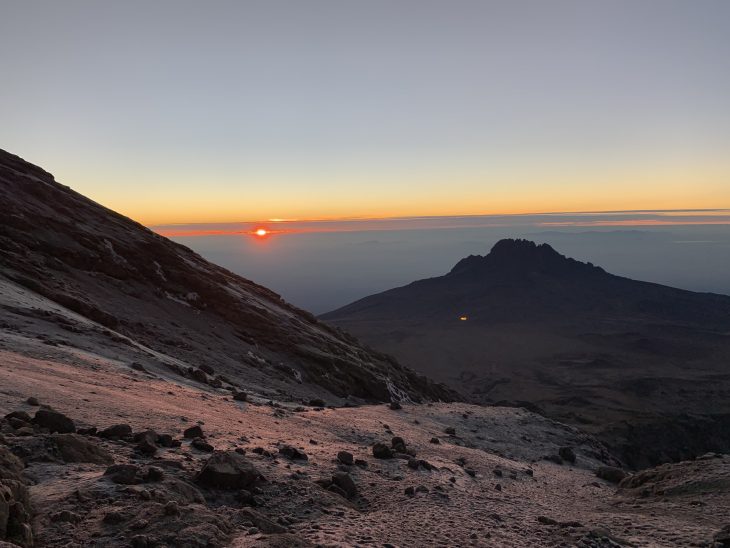
“Kilimanjaro Millennial Style: The Mountain We Climbed” can be pre-ordered on the John Hunt Publishing website, as well as through Amazon and Google Books. It is set to release on Jan. 28.



